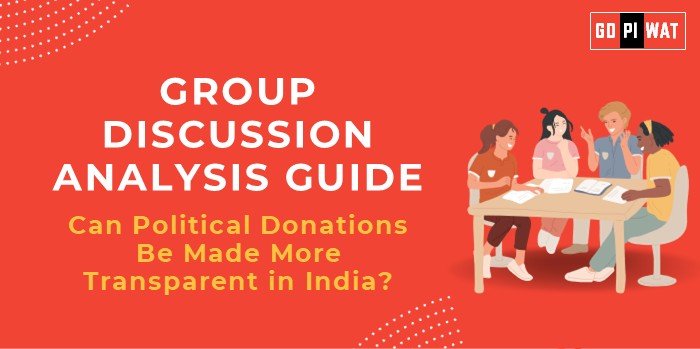📋 Group Discussion Analysis Guide
💰 Can Political Donations Be Made More Transparent in India?
🌟 Introduction to the Topic
📜 Opening Context
Political donations play a pivotal role in democracy by funding election campaigns and party activities. However, in India, concerns about the opacity surrounding these contributions raise significant questions about accountability and its impact on governance and electoral fairness.
🌐 Topic Background
The Electoral Bonds Scheme, launched in 2018, sought to bring order to political donations by enabling registered parties to receive contributions through anonymous banking channels. However, this anonymity has sparked debates about whether the scheme truly enhances transparency or increases secrecy. The issue is critical in ensuring that democracy remains free from undue financial influence.
📊 Quick Facts and Key Statistics
- Total Electoral Bonds Sold (2018–2024): ₹12,145.87 crore – Illustrates the high volume of anonymous political funding.
- BJP’s Share of Electoral Bonds (2018–2024): Approximately 50% – Reflects the concentration of funds among major political parties.
- Congress’s Share of Electoral Bonds (2018–2024): Approximately 10%.
- Global Transparency Index Rank (India, 2023): 93rd out of 180 countries – Highlights India’s struggle with corruption perceptions and governance.
- FCRA Amendments (2020): Enabled unlimited corporate contributions, including from foreign-owned entities, raising concerns about external influence.
👥 Stakeholders and Their Roles
- Government and Regulatory Bodies: Implement frameworks and oversee transparency, with the Election Commission playing a pivotal role.
- Political Parties: Primary recipients of donations, often opposing stricter disclosure norms.
- Civil Society and Media: Advocate for greater accountability and public oversight.
- Corporate Donors and Individuals: Major contributors whose interests may align with maintaining opacity.
🏆 Achievements and Challenges
✅ Achievements
- Introduction of the Electoral Bonds Scheme formalized donation channels.
- Reduced dependence on cash-based political funding.
🚧 Challenges
- Lack of donor identity disclosure in electoral bonds raises accountability issues.
- Disproportionate distribution of funds among major political parties creates an imbalance.
- Weak enforcement of regulations, enabling misuse.
🌍 Global Comparisons
- United States: Full public disclosure of donations above $200 through the Federal Election Commission.
- United Kingdom: Caps on anonymous contributions ensure accountability.
📚 Case Studies
- Karnataka Assembly Elections 2023: The surge in electoral bond usage highlighted the continued reliance on opaque funding.
🔍 Structured Arguments for Discussion
- Supporting Stance: “Electoral bonds have streamlined donation processes, reducing reliance on cash contributions and promoting cleaner campaign financing.”
- Opposing Stance: “The anonymity offered by electoral bonds fosters unchecked corporate influence, undermining democratic fairness.”
- Balanced Perspective: “While the Electoral Bonds Scheme addresses certain inefficiencies, reforms like mandatory donor disclosures are essential for ensuring equitable democracy.”
🎯 Effective Discussion Approaches
- Opening Approaches:
- “India’s introduction of electoral bonds has facilitated donations worth ₹12,145 crore, but its implications on transparency warrant a closer look.”
- “The dual challenge of addressing foreign influence and opaque funding demands robust institutional reforms.”
- Counter-Argument Handling:
- Response to Corporate Influence Concerns: “Stricter amendments to the FCRA can mitigate disproportionate corporate influence.”
- Rebuttal to Privacy Concerns: “Donor anonymity can coexist with public accountability through selective regulatory disclosure.”
🔍 Strategic Analysis of Strengths and Weaknesses
💪 Strengths
- Streamlined donation mechanisms through electoral bonds.
- Reduction in cash-based political funding.
❌ Weaknesses
- High levels of anonymity foster non-disclosure.
- Weak institutional oversight and enforcement.
🚀 Opportunities
- Leveraging blockchain technology for auditable yet anonymous donations.
- Introducing public financing models to minimize private fund dependence.
⚠️ Threats
- Risk of undue corporate and foreign influence.
- Potential erosion of democratic equity.
🎓 Connecting with B-School Applications
- Real-World Applications: Policy analysis frameworks for transparency initiatives; ethical leadership in governance and funding systems.
- Sample Interview Questions:
- “What are the ethical challenges of anonymous political donations?”
- “How can blockchain improve transparency in electoral funding?”
- Insights for B-School Students:
- Exploring the intersection of transparency with corporate social responsibility (CSR).
- Investigating FinTech solutions for enhancing political funding accountability.


